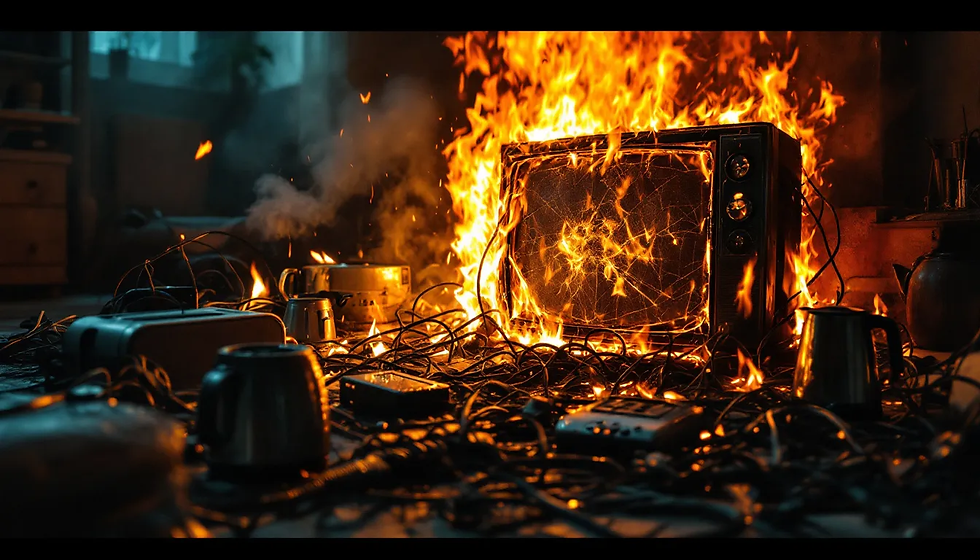Fishy Smell in Home? Electrical Fire Smell Warning Sign
- Antech Electric

- Apr 16, 2025
- 11 min read
Updated: May 22, 2025

A fishy smell in your home can be more than just unpleasant. It could be a warning sign of a potential electrical fire. This odor is often referred to as an electrical burning smell and should be taken seriously as it may indicate underlying electrical issues.
This smell can be due to melting insulation or wiring. These materials can release chemicals that smell like fish when they overheat. Unusual smells like this are often the first indicator of an electrical fire risk, so it’s crucial to identify the source of the smell promptly to prevent potential fire hazards.
Ignoring a persistent fishy smell could lead to dangerous consequences. If you notice this odor, it’s important to turn off the power to the suspected area and contact a professional electrician.
In this article, we’ll explore the causes of a fishy smell in the home, how to address it, and how to prevent it from happening in the future. We’ll also provide tips on how to get rid of the fishy smell in your house.
Understanding the Fishy Smell in your Home
A sudden fishy odor in your home can be perplexing. It’s essential to understand that this smell is often unrelated to actual fish or seafood. Instead, the odor might point to a hidden danger lurking within your electrical system. When electrical components overheat, they can emit volatile organic compounds, which may smell like fish to our noses.
This smell is your first clue that something could be wrong. Typically, electrical fires don’t start with flames but with overheating, which melts insulation and materials. Plastic insulation on electrical wires is often the source of the fishy odor when it overheats. These materials release fumes that produce an acrid or fishy odor.
This smell is very clear because of the chemicals in it, like phenolic compounds.
It’s important to act quickly if you detect this smell. The longer such problems are left unattended, the greater the risk of them escalating into a more severe issue, like a fire. Identifying and addressing the source of the fishy odor should be a priority for every homeowner. Other warning signs may also appear, such as buzzing sounds or flickering lights, which can indicate additional electrical problems.
Why Do I Have a Fishy Smell in My Home?
There are several reasons you might encounter a fishy smell in your home. Overheated electrical components are a primary source, often due to the age or wear and tear of the wiring and insulation. As these materials overheat, they release chemicals that smell fishy or burning.
Outdated electrical systems are more susceptible to these issues. Many older homes have wiring that isn’t suited for modern electrical loads, resulting in overheating. The increased power demands of modern appliances can overwhelm an outdated or faulty wiring system, leading to overheating and odors. Additionally, malfunctioning electrical appliances might contribute to the odor. If an appliance experiences a fault, it can heat up unexpectedly, leading to that peculiar smell.
It’s crucial to consider these underlying issues. Regular inspection and maintenance of your electrical system can prevent situations that cause these unpleasant and dangerous odors. Understanding why the smell occurs empowers you to take swift action and prevent potential harm to your home and family.
Recognizing Electrical Fire Smells

Recognizing the smell of an electrical fire can prevent disasters. It’s essential to know that this smell is quite distinct. Unlike typical household odors, electrical fires emit a unique set of scents. These can include a fishy smell but may also involve other acrid or chemical odors such as a burning plastic smell in your home. If you smell burning plastic, it is a specific warning sign of potential electrical fire and should be taken seriously.
The reason these smells occur is due to burning or overheating components. For instance, when wiring insulation burns, it releases unpleasant odors. A foul smell can also indicate electrical issues and should not be ignored. This happens when excessive electrical load causes wiring to overheat, posing a serious fire risk. Being able to identify the smell of something burning early on can allow you to address the problem before it escalates.
An electrical fire smell often starts subtly. You might notice a burning smell lingering in the air, initially faint but growing stronger with time. It’s crucial to trust your senses and investigate any burning smell in your home immediately. A quick response can be the difference between minor repairs and a significant fire hazard, so never ignore these warning signs.
What Does an Electrical Fire Smell Like?
Identifying the scent of an electrical fire can be tricky but is vital for safety. Electrical fires typically smell like burning plastic or smell of burnt rubber and chemicals in your house. This is due to materials such as wire insulation melting away under heat.
The smell may also resemble burnt rubber or have a metallic tinge. Many describe it as similar to a warm, fishy odor which, although unconventional, acts as a vital clue. When electrical components malfunction, these odors are often the first sign.
It’s important to note that this smell is persistent and distinctive from typical household scents. If you detect these smells, it’s essential to investigate their source immediately. These odors are a serious sign of potential electrical danger and should prompt immediate action. Ignoring them can lead to more severe consequences like fires or electrical damage. Early detection and action are key to ensuring your home’s safety.
Potential Causes of Fishy Odor in House
A fishy odor wafting through your home might be puzzling, but it’s not uncommon. This smell could point to serious underlying issues, particularly with electrical systems. When components like wiring or outlets overheat, they may emit a burnt fish-like smell. Electrical outlets and electrical fixtures are common sources of these odors. This is due to the chemicals released from melting insulation or plastic.
Yet, electrical issues aren’t the only culprits. Cooking residues, lingering seafood odors, or poor ventilation could contribute to unpleasant smells. Kitchen appliances themselves may overheat, increasing the potential for fishy scents.
Another possibility involves mold or mildew presence, which thrives in damp environments, often producing musty, fishy odors. Poorly maintained air conditioning systems can spread such odors throughout the home.
In any case, identifying and addressing the source of a fishy smell is crucial. Whether it’s an overused electrical outlet or a forgotten fish dinner, investigating promptly is essential. Loose wires can also be a hidden cause of fishy or burning odors and should be checked by a professional.
Overheating Electrical Components
Electrical systems are sensitive and vulnerable to wear over time. When components overheat, they pose serious risks. Heat can cause wiring insulation to melt, which often releases a fishy smell. Overheating electrical wires within the wiring system can be a primary source of these odors and potential hazards. This overheating often results from overloading circuits or using faulty appliances. If you detect a fishy odor in conjunction with warm or discolored outlets, it’s vital to take immediate action.
Common Electrical Components That May Cause Odors
Certain electrical components are more prone to overheating and causing odors. These include power outlets, circuit breakers, lighting fixtures, and metallic fixtures. Faulty wiring within these can emit odors as they heat up. Appliances like stoves or space heaters can also generate odd smells if they malfunction or overheat. If you notice a burning smell coming from a specific appliance, identifying and unplugging it can help isolate the problem and prevent further hazards.
Burning Plastic and Rubber Smells
Odors reminiscent of burning plastic or rubber can indicate a significant issue. Such smells often result from hot circuits or appliances, signaling potential electrical failures. The components made from these materials, when overheated, release distinct chemical odors. It’s essential to address these smells promptly, as they could foretell an impending electrical fire. Ignoring these odors can result in a small electrical fire or even a small fire, especially if the source is not identified and corrected. Electrical fires start when insulation or wiring overheats, and a fire starts as a result of this breakdown.
The Role of Circuit Breakers in Preventing Electrical Fires

Circuit breakers are one of the most important safety features in your home’s electrical system. Their main job is to protect your home from electrical fires by automatically shutting off the flow of electricity when they detect an overload or a short circuit. This quick response helps prevent overheating of electrical components, which is a leading cause of electrical fires.
When a circuit breaker trips, it’s acting as a first line of defense, stopping the flow of electricity before it can cause wires or insulation to overheat and potentially ignite. Without properly functioning circuit breakers, even a small electrical issue could quickly escalate into a dangerous fire. That’s why regular inspection and maintenance of your circuit breakers are essential for preventing electrical fires and keeping your home safe.
If you haven’t had your circuit breakers checked recently, consider scheduling an electrical inspection with a licensed electrician. This simple step can help ensure your electrical system is working as it should and reduce the risk of fires caused by faulty wiring or malfunctioning electrical components.
How Circuit Breakers Protect Your Home
Circuit breakers are designed to keep your home and family safe from electrical fires in several key ways:
Interrupting the power supply during danger: When an overloaded circuit or short circuit is detected, circuit breakers immediately cut off electricity to prevent overheating and fire.
Protecting electrical components: By stopping excess current, circuit breakers help prevent damage to wiring, outlets, and other electrical components, reducing the risk of electrical fires.
Easy reset after a trip: Once the issue is resolved, circuit breakers allow you to safely restore power without complicated repairs.
Identifying electrical issues: Frequent tripping can signal problems like faulty wiring or overloaded circuits, giving you an early warning to address potential fire hazards before they escalate.
By understanding how circuit breakers work and paying attention to their behavior, you can catch early warning signs of electrical issues and take action to prevent fires in your home.
Signs Your Circuit Breaker May Be Failing
A failing circuit breaker can put your home at serious risk for electrical fires. Watch for these warning signs that your circuit breaker may need attention:
Frequent tripping: If your circuit breaker trips often without a clear reason, it could indicate a deeper electrical issue.
Failure to trip: If the breaker doesn’t shut off during an overload or short circuit, it’s not providing the protection your home needs.
Visible damage: Rust, corrosion, or other signs of wear on the breaker panel are red flags.
Burning smells or odd smells: Any burning smells or unusual odors coming from your circuit breaker panel should be taken seriously, as they may signal overheating or melting components.
Flickering or dimming lights: Lights that flicker or dim unexpectedly can be a sign of a faulty circuit breaker or other electrical problems.
If you notice any of these signs, contact a licensed electrician right away. Prompt action can help prevent electrical fires and keep your home safe.
Health Implications of Electrical Fires
The dangers of electrical fires go far beyond property damage—they can have serious health consequences for everyone in your home. When an electrical fire breaks out, it releases smoke and toxic fumes that can be extremely harmful if inhaled. These fumes often contain hazardous chemicals like ketones and aldehyde gases, which can cause immediate and long-term health problems.
Exposure to the smoke from an electrical fire can lead to respiratory issues, skin and eye irritation, and even more severe complications. In the worst cases, electrical fires can result in life-threatening injuries or fatalities. That’s why it’s so important to take every warning sign seriously and act quickly to prevent electrical fires before they start.
Short-Term and Long-Term Health Risks
Electrical fires can impact your health in both the short and long term. Here’s what you need to know:
Short-term health risks:
Respiratory problems, such as coughing, wheezing, and shortness of breath
Skin irritation and burns from exposure to heat or chemicals
Eye irritation, redness, and vision problems caused by smoke
Headaches, dizziness, and nausea from inhaling toxic fumes
Long-term health risks:
Increased risk of cancer and other serious diseases due to exposure to toxic chemicals
Permanent damage to the lungs and respiratory system
Neurological problems, including memory loss and cognitive impairment
Psychological trauma, anxiety, and stress following a fire incident
If you are exposed to smoke or fumes from an electrical fire, seek medical attention immediately—even if you feel fine at first. Early intervention can make a significant difference in your recovery. To protect your health and your home, schedule regular electrical inspections, avoid overloading outlets, and take all warning signs seriously. If you suspect an electrical fire, leave your home right away, stay at a safe distance, and call the fire department or emergency services for help. Your safety is always the top priority.
What to Do If You Notice an Electrical Burning Smell
If you notice a fishy smell in your home, swift action is vital. First, try to pinpoint the source. Do you detect the odor near an electrical outlet or appliance? If so, stop using it immediately and cut off the power supply to that area. Check for other signs of a potential electrical issue, such as warm sockets or flickering lights. If you hear buzzing or notice a buzzing sound, these are additional warning signs of electrical problems that may indicate wiring issues or overloaded circuits. Ventilate the space by opening windows to disperse any lingering fumes; open windows help improve air quality and make the environment safer until the smell dissipates. It’s important not to ignore these signs; they could indicate a serious hazard.
Immediate Actions to Not Let Electrical Fires Start
Upon encountering a fishy odor, prioritize safety. Turn off all relevant electrical appliances and unplug devices in the affected area. Ensure that the circuit serving that part of your home is switched off at the breaker box. After ensuring immediate safety, refrain from using scented sprays or candles to cover up the smell. This might obscure the issue without addressing it. Consider gathering everyone outside the house until you're sure there's no immediate danger. These steps, though simple, can be vital in preventing potential disasters.
When to Call an Electrician
Reach out to a licensed electrician if the smell persists, especially after taking initial measures. Their expertise in diagnosing electrical issues is crucial. If you notice immediate dangers such as sparks, smoke, or other concerning signs, contact an emergency electrician right away. For thorough inspection and repairs, always hire an experienced electrician to ensure all issues are addressed safely. Prioritize your safety and let an expert handle potential electrical hazards safely.
Preventive Measures to Avoid Fishy Smells
Preventive measures are key to a safe, odor-free home. Regularly checking your electrical systems can prevent issues before they start. Schedule inspections with a certified electrician every few years. Consider installing smoke detectors and carbon monoxide alarms for additional safety. Also, avoid overloading circuits and use appropriate wattage in light fixtures. These proactive steps can greatly reduce the risk of electrical hazards. Regular maintenance and vigilance can help prevent a house fire caused by electrical issues. Staying vigilant and proactive can not only protect your home but also offer peace of mind. Keeping a well-maintained home will help you detect and address any warning signs early.
Regular Electrical Inspections
Routine electrical inspections are essential for identifying potential hazards before they escalate. An electrician can spot wear and tear or outdated components. They can also offer recommendations to enhance safety. Regular inspections ensure your system functions efficiently and safely. This simple step can save you from costly repairs and hazards.
Maintaining Electrical Appliances
Proper maintenance of electrical appliances can help prevent unexpected issues. Keep appliances clean and free of dust to avoid overheating. Follow manufacturers' guidelines for use and maintenance. Regularly inspect plugs and wires for damage. Replace defective parts promptly. By ensuring appliances are in good working order, you minimize fire risks and extend their lifespan.
Frequently Asked Questions
What does an electrical fire smell like?
An electrical fire typically smells like burning plastic, rubber, or chemicals due to the melting or burning of wire insulation and other electrical components. This distinct odor can also have a fishy or metallic tinge, which is often a warning sign of overheating electrical parts before a fire starts.
Does an electric fire have a smell?
Yes, an electric fire usually has a noticeable smell. It often emits a burning plastic or fishy odor caused by overheating or melting insulation on wires and electrical fixtures. This smell is a critical warning sign that should never be ignored.
What are the symptoms of electrical fire fumes?
Symptoms of exposure to electrical fire fumes can include respiratory issues such as coughing, wheezing, and shortness of breath, as well as eye and skin irritation. These fumes contain toxic chemicals like ketones and aldehydes, which can cause headaches, dizziness, nausea, and in severe cases, long-term health problems.
What are the signs of an electrical fire?
Signs of an electrical fire include unusual or fishy burning smells, flickering or dimming lights, buzzing sounds from outlets or switches, warm or discolored electrical outlets, frequent tripping of circuit breakers, visible sparks, and sometimes smoke or charred marks near electrical fixtures. Recognizing these early warning signs and acting quickly can help prevent a serious fire.

%20(2220%20x%201920%20px).png)
%20(1).png)



Comments